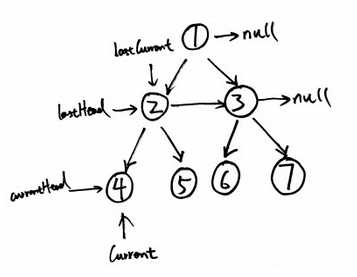标签:
Given a binary tree
struct TreeLinkNode {
TreeLinkNode *left;
TreeLinkNode *right;
TreeLinkNode *next;
}
Populate each next pointer to point to its next right node. If there is no next right node, the next pointer should be set to NULL.
Initially, all next pointers are set to NULL.
Note:
For example,
Given the following perfect binary tree,
1
/ 2 3
/ \ / 4 5 6 7
After calling your function, the tree should look like:
1 -> NULL
/ 2 -> 3 -> NULL
/ \ / 4->5->6->7 -> NULL
Key to the solution is to traverse tree level by level. Therefore, we can use BFS. Time complexity O(n), n is the number of nodes, and space cost is O(n).
1 /** 2 * Definition for binary tree with next pointer. 3 * public class TreeLinkNode { 4 * int val; 5 * TreeLinkNode left, right, next; 6 * TreeLinkNode(int x) { val = x; } 7 * } 8 */ 9 public class Solution { 10 public void connect(TreeLinkNode root) { 11 // We can use BFS to solve this problem 12 List<TreeLinkNode> current = new ArrayList<TreeLinkNode>(); 13 List<TreeLinkNode> next; 14 if (root == null) 15 return; 16 current.add(root); 17 while (current.size() > 0) { 18 next = new ArrayList<TreeLinkNode>(); 19 int length = current.size(); 20 for (int i = 0; i < length; i++) { 21 TreeLinkNode currentTreeNode = current.get(i); 22 if (i < length - 1) 23 currentTreeNode.next = current.get(i + 1); 24 else 25 currentTreeNode.next = null; 26 if (currentTreeNode.left != null) 27 next.add(currentTreeNode.left); 28 if (currentTreeNode.right != null) 29 next.add(currentTreeNode.right); 30 } 31 current = next; 32 } 33 } 34 }
Consider for one node, the connection is done when:
1. Its left node (if exists) connect to its right node.
2. Its right node (if exists) connect to its next node‘s left child.
3. Its left child and right child are all connected.
Note the prerequisite for this problem is perfect binary tree (every parent has two children). Time complexity O(n), space cost O(1).
1 /** 2 * Definition for binary tree with next pointer. 3 * public class TreeLinkNode { 4 * int val; 5 * TreeLinkNode left, right, next; 6 * TreeLinkNode(int x) { val = x; } 7 * } 8 */ 9 public class Solution { 10 public void connect(TreeLinkNode root) { 11 if (root == null) 12 return; 13 if (root.left != null) 14 root.left.next = root.right; 15 if (root.right != null && root.next != null) 16 root.right.next = root.next.left; 17 connect(root.left); 18 connect(root.right); 19 } 20 }
We can use four pointers to traverse the tree.
(referrence: ProgramCreek)

1 /** 2 * Definition for binary tree with next pointer. 3 * public class TreeLinkNode { 4 * int val; 5 * TreeLinkNode left, right, next; 6 * TreeLinkNode(int x) { val = x; } 7 * } 8 */ 9 public class Solution { 10 public void connect(TreeLinkNode root) { 11 if (root == null) 12 return; 13 TreeLinkNode lastHead = root;//prevous level‘s head 14 TreeLinkNode lastCurrent = null;//previous level‘s pointer 15 TreeLinkNode currentHead = null;//current level‘s head 16 TreeLinkNode current = null;//current level‘s pointer 17 18 while (lastHead != null) { 19 lastCurrent = lastHead; 20 currentHead = lastHead.left; 21 current = lastCurrent.left; 22 while (lastCurrent != null && current != null) { 23 current.next = lastCurrent.right; 24 current = current.next; 25 lastCurrent = lastCurrent.next; 26 if (lastCurrent != null) { 27 current.next = lastCurrent.left; 28 current = current.next; 29 } 30 } 31 lastHead = currentHead; 32 currentHead = null; 33 } 34 } 35 }
Populating Next Right Pointers in Each Node 解答
标签:
原文地址:http://www.cnblogs.com/ireneyanglan/p/4845698.html